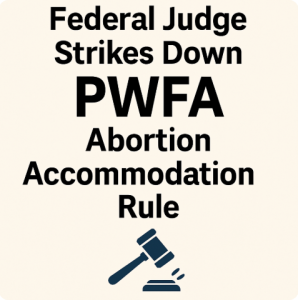On March 3, 2022, President Biden signed into law the Ending Forced Arbitration of Sexual Assault and Sexual Harassment Act of 2021 (“EFAA”). Under this law, employers cannot enforce pre-dispute arbitration agreements against persons who bring claims for sexual assault or sexual harassment that occurred on or after March 3, 2022. Employees and others who sign pre-dispute arbitration agreements may choose to pursue such claims against employers in court.
One of the many questions that arose under the EFAA was whether cases would end up with sexual harassment claims proceeding in court and other employment-related claims proceeding in arbitration. Last month, a federal court in the Southern District of New York (SDNY) set groundbreaking precedent when it found, for the first time, that the EFAA renders an arbitration agreement unenforceable as to an entire case where plaintiff pleads a viable sexual harassment claim.
In Johnson v. Everyrealm, Inc. et al., Plaintiff Teyo Johnson alleged not only sexual harassment under federal, state and local law, but also various discrimination claims, whistleblower retaliation in violation of the New York Labor Law and common-law intentional infliction of emotional distress. Defendant Everyrealm, a virtual real estate company, argued that the sexual harassment claim should be dismissed and that, because the former employee had signed an arbitration agreement, the rest of the case belonged in arbitration not in court. In a decision dated February 24, 2023, SDNY Judge Paul A. Engelmayer disagreed. Judge Engelmayer first analyzed Johnson’s sexual harassment claim under the low threshold of the New York City Human Rights Law and found that Johnson pled a viable claim. Judge Engelmayer then analyzed the EFAA, which says that pre-dispute arbitration agreements are not “valid or enforceable with respect to a case which is filed under Federal, Tribal, or State law and relates to the sexual assault dispute or the sexual harassment dispute” (emphasis added). The Court read the language of the EFAA to mean that when a plaintiff pleads a plausible sexual harassment claim, then the EFAA allows all of plaintiff’s employment-related claims to be heard in court.
In a companion case, Yost v. Everyrealm, Inc. et al., Judge Engelmayer applied the same analysis with a different result. Plaintiff Yost had also signed a pre-dispute arbitration agreement and also alleged sexual harassment and various other claims. In that case, however, the Court found that plaintiff Yost had not pleaded a viable claim for sexual harassment, even under the low threshold of the New York City Human Rights Law, and therefore the EFAA did not prevent defendants from compelling arbitration of plaintiff’s other employment-related claims.
The Johnson and Yost cases show that a plaintiff may need to brief the merits of their sexual harassment claim in the very early stages of a case, so that a court can first decide if the case belongs in court or in arbitration. The decisions also leave open the question of how such cases might fare in a state court that does not follow the heightened pleading standard used in federal courts.
We will keep an eye on future EFAA developments, including whether this decision will be appealed and whether other courts will follow it. In the meantime, if you have questions or concerns about arbitration agreements or the EFAA, please contact Chaim Book at cbook@booklawllp.com.

